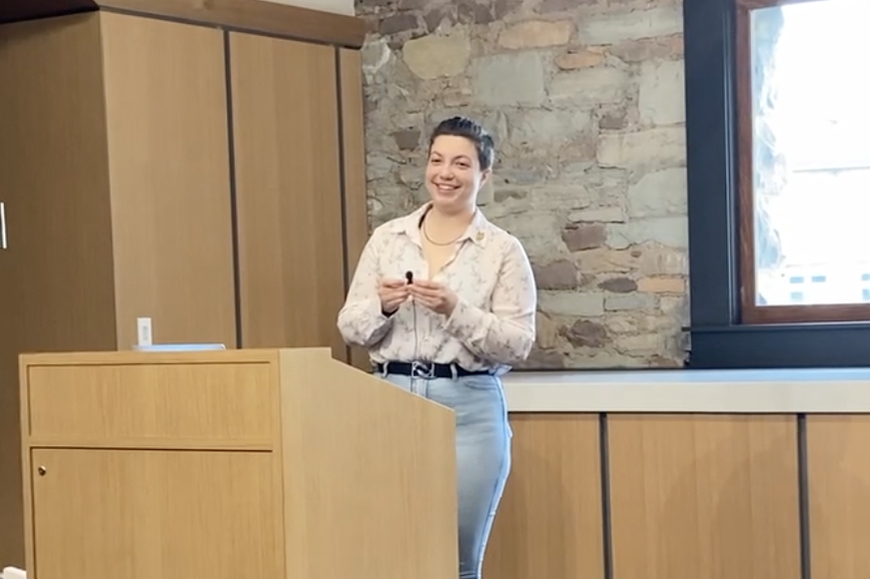A Senior Celebration
On May 12, the eve of the University's undergraduate Commencement, English Chair Kathryn Nuernberger welcomed students and their family members and friends to a festive celebration of graduating English majors in the Pillsbury Hall attic. Due to current construction in 3M Arena at Mariucci, the usual College of Liberal Arts Commencement was subsumed this year into a U-wide ceremony at Huntington Bank Stadium; English sought to provide a more personal recognition of graduating seniors with a reception and short program.
Graduating English major Rochita Chatterjee began the remarks by describing their first day in “Modern Fiction” as a first-year student. As the class close-read Bonnie Jo Campbell’s story collection American Salvage, Chatterjee experienced a wave of both fascination and homecoming that eventually led to a double major in English and Economics. “Pursuing an English education is incredibly underrated,” Chatterjee said. “Students of English have an ability to communicate, understand, and connect with others that is noticeably absent in those who do not pursue humanities. There is not a single industry that does not need people who can write clearly, people who will do the work to understand multiple perspectives, people who can read difficult texts.”
Chatterjee cited Newton, Einstein, and Copernicus as exemplars of the humanities as much as the sciences: “They read a lot of books, they asked important questions, and dared to be philosophical enough to ask ‘why.’” In similar fashion, Chatterjee said, “Many of us who pursue degrees in English came here seeking knowledge as much as career preparation. The coursework in English inspires us to forge our own path, care about others, and give to our community; that’s why we are educators, lawyers, journalists, authors, therapists, policy makers, social workers, philosophers, community organizers, and so much more. An English degree has equipped me with skills that will not only translate into my career but that are useful in all aspects of life.”
Chatterjee next introduced Professor Brian Goldberg, expressing gratitude for the senior seminar he'd just led on "British Romantic Poetry & Contemporary Poetics." The Interim Director of Undergraduate Studies responded that he himself was grateful to Chatterjee, and to English seniors in general, for "showing up": bringing their best selves—opinions, analyses, experiences—to classroom conversation. He emphasized the weight of what the students had accomplished and the difficulty they had overcome.
Turning to Robert Browning's poem "Fra Lippo Lippi,” he quoted, "Art was given for that; / God uses us to help each other so, / Lending our minds out." As a teacher, Goldberg noted, he is humbled by the moments when 25 students bring their 25 different interpretations to bear on a text, and everyone's understanding is expanded. It's students who make the magic happen, he told the seniors. Professor Goldberg this spring received the University's top award for teaching undergraduates, the Horace T. Morse-Alumni Association Award for Outstanding Contributions to Undergraduate Education.
Portraying college graduation as a rocket launch, senior Valerie Paul followed up on Goldberg’s theme. “I promise you’re more prepared than you think you are for what’s coming next,” the 2022 President’s Student Leadership & Service Award recipient assured the students. “One of the most important skills in today’s day and age, with a mass influx of misinformation and disinformation, is critical thinking, the core tenet of an English degree,” Paul said. “This ability to pick apart phrases and get at their meanings and goals, combined with the myriad perspectives and experiences we’ve formed during our time at the U, will serve us well no matter where we go or what we do next.”
Paul also described the practical impact of the group FUSE, the Fellowship for Undergraduate Students in English: “Having that network for everything from book recommendations to writing support and job-hunting help phenomenally boosted my confidence as graduation approached.”
Introducing Professor Kim Todd, Paul praised Todd’s leadership of their senior seminar in creative writing spring semester. (It was a happy coincidence that both student speakers introduced their seminar professors!) Chair of the department’s Walter Nathan Literary Initiatives Committee, Todd then announced the winners of the inaugural Walter Nathan Prize for Undergraduate Creative Writers: $1000 awards given to three students minoring in creative writing whose work shows exceptional literary promise. Todd presented branded mugs to Stella Mehlhoff for fiction, Keng Xiong for poetry, and Mikayla Hegrenes for nonfiction. Graduating senior Hegrenes took the podium next and read from the winning piece “The Next Girl.”
After the remarks, attendees had time to sample refreshments, participate in door prize drawings, and greet former classmates. At one table, several seniors reminisced about classes they’d taken together and their favorite professors. “It was a class with Professor Goldberg that made me an English major,” said one. Encouraged by the others, the student caught up with Goldberg at the door to thank him.
Earlier, in their remarks, Paul marked the importance of English studies and the students’ role within them. “It’s easy to forget, wrapped up as we are in our essays and discussion posts, that literature and writing have a huge impact on society, on culture, on everyday life,” Paul concluded. “We are all part of the next generation building those changes.”



